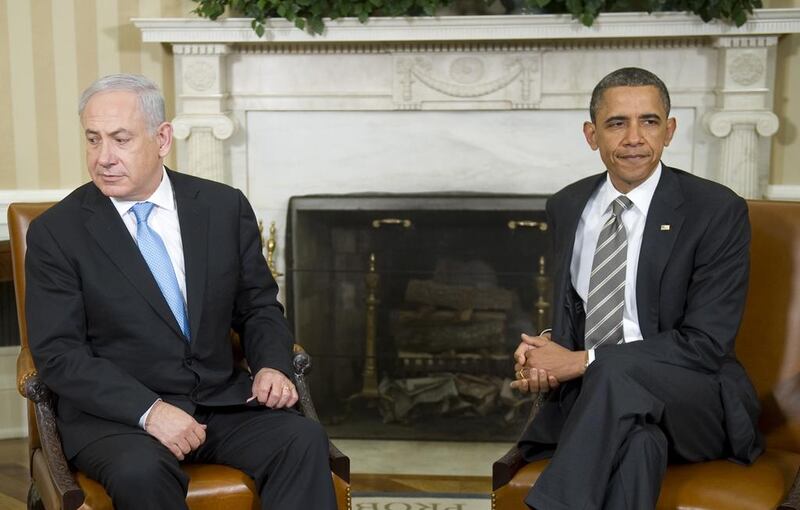In case you haven’t noticed, Barack Obama’s US administration is in the midst of a very public spat with Benjamin Netanyahu’s government in Israel. The tit-for-tat exchanges have been noted in the press, with reporters and some analysts providing banal motives for the acrimony.
Some commentators have suggested “revenge” – pointing to Mr Netanyahu’s support for Mr Obama’s rival in the 2012 election, Mitt Romney. Others have relied on the old Washington standard: “bad chemistry”. I believe that it would be wrong to attribute the bitter words and bad feelings to trite personal concerns, because there may be a strategic purpose being served by this drama.
A few weeks ago, following a Netanyahu-Obama meeting in Washington, the White House rebuked the Israeli leader’s announcement of new settlement construction in occupied Jerusalem and the West Bank. Mr Netanyahu charged that the US criticism failed to reflect “American values”, bizarrely claiming that since Palestinians have the right to live anywhere they wish in Israel, Jews should not be denied that same right. To their credit, Israeli commentators were quick to point out that this was sheer nonsense since Palestinians cannot live anywhere they please.
The White House shot back, suggesting Mr Netanyahu’s words were ungrateful, reminding him that the US had funded Israel’s “Iron Dome” defence shield.
Round two came last week as Mr Netanyahu’s defence minister Moshe Ya’alon came to Washington and left after failing to secure meetings with top administration officials. The Israeli press made it clear that it was the minister’s undiplomatic criticism of US secretary of state John Kerry – Mr Ya’alon had charged that Mr Kerry was driven by a “messianic” complex in his efforts to achieve an Israeli-Palestinian peace – that had caused him to become persona non grata at the State Department and White House.
The latest episode in this spat came in an interview in which an unnamed “senior administration official” used a profanity meaning cowardly to describe Mr Netanyahu, adding: “The good thing is he is scared to launch wars. The bad thing about him is that he won’t do anything to reach an accommodation with the Palestinians or with the Sunni Arabs. The only thing he’s interested in is protecting himself from political defeat ... he’s got no guts.”
What was most interesting was that the administration let those words stand for a full day, for maximum impact, before making any effort to diplomatically wind them back. The reaction in Israel was immediate and sustained. Mr Netanyahu acted like a wounded warrior claiming that he was being attacked solely because he was defending Israel.
While Mr Netanyahu had some defenders, many commentators were not buying his arguments. They charged that his behaviour was not only putting the US-Israel relationship at risk, it was also isolating Israel in the world community. They noted the decision of Sweden to recognise the State of Palestine, pro-Palestinian votes in Britain and Ireland, and new warnings from the EU over settlement plans in Jerusalem.
Mr Netanyahu may be counting on a Republican Congress to save him from the administration’s pressure, but opinion in Israel appears not to share his confidence that the country can weather the storms created by his defiance. They are warning that regardless of which party wins this week’s US midterm election, Israel may be facing two long and lonely years.
This is what, I believe, is behind the US administration’s gambit. Mr Obama has long been frustrated by Mr Netanyahu’s wily manoeuvring. But knowing that the opposition in Israel is too weak to win government, something had to be done to shake up internal Israeli debate.
The “conventional wisdom” is that Israelis will only make peace when they are given everything they want and feel secure. In fact, the opposite is true. It is only external pressure that has forced Israelis to make the right choice. George HW Bush and his secretary of state, James Baker, did just that when they denied loan guarantees to then prime minister Yitzhak Shamir in the early 1990s. Bill Clinton did much the same when he refused to meet Mr Netanyahu. In both instances, Israelis got the message and these Likud leaders were voted out, replaced by governments that promised to restore the US-Israeli relationship and move towards peace.
Mr Kerry is right to link the conflict against ISIL with the Israel-Palestine conflict. The last thing the US needs is a pyromaniac in Jerusalem pouring petrol on the fires that will inflame the entire region.
Mr Netanyahu must go, but for that to happen, the debate in Israel must change and its pro-peace forces coalesce around a candidate who will move the country in a different direction. If Washington were to back down, Mr Netanyahu would win, peace would lose, and the US would not get another opportunity any time soon to restore its leadership in the region.
Dr James Zogby is the president of the Arab American Institute
Twitter: @aaiusa





